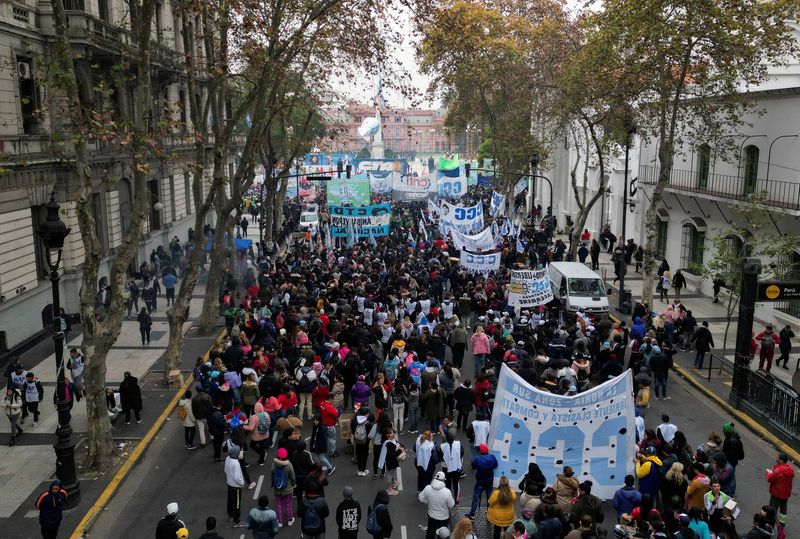By Hernan Nessi and Jorgelina do Rosario
BUENOS AIRES/LONDON (Reuters) -Argentina on Monday set new weaker trade-related exchange rates while keeping the official peso rate stable, in a push to meet expectations in its $44 billion agreement with the International Monetary Fund while avoiding a politically costly devaluation.
Corn exporters will be able to sell their goods abroad at 340 pesos per U.S. dollar, according to a government decree, a temporary rate to bolster exports until Aug. 31. That is about 27% weaker than the current rate of 268 pesos per dollar, which remained unchanged.
The government will also introduce a 7.5% tax on some goods imports and a 25% levy on imports of most services, with new FX rates at around 288 and 335 pesos per dollar, respectively, according to a government official.
The move comes as the country faces delayed talks with the IMF on the fifth review of a $44 billion program, which was scheduled for June.
The measure is a "half-way point between the devaluation requested by the IMF and the political order not to devalue during an election year," said Roberto Geretto, an economist at Fundcorp.
Argentina's government is grappling with an annual inflation rate of over 100% which a wider devaluation would exacerbate.
"The fiscal devaluation improves Treasury revenues and helps save reserves," Geretto added, but there are still "points to resolve" in negotiations. Both parties have said a deal is close, but an agreement is not finalized yet.
The country's overseas bonds climbed as much as 1.4 cents on the dollar, according to MarketAxess data. The 2035 dollar note is trading at 31.8 cents, its highest level since January 2022, although still at deeply distressed levels.
An IMF spokesperson said the measures announced by the Argentine authorities are "positive to strengthen reserves and consolidate the path of fiscal order, fundamental variables to strengthen economic stability."
'BIG PACKAGE OF DISBURSEMENTS'
Argentina faces maturities with the IMF worth some $3.4 billion between July and August, at a time when the central bank's net reserves are about $6.5 billion in the red.
Buenos Aires is hoping to alter the economic goals it had agreed with the global lender and bring forward some IMF disbursements scheduled for this year as it battles a severe financial crisis which a lack of reserves could exacerbate.
An economy ministry source told Reuters the disbursement program for the second half of 2023 has been agreed and the staff level agreement could be sealed on Wednesday or Thursday.
Economy Minister Sergio Massa, who is running for president ahead of an August primary vote, said on Sunday in an interview with a local TV network that there is a "big package of disbursements" in August and November under the IMF program, without providing any further details.

Under the current program, the country is expected to get $4 billion in July, more than $3.3 billion in September and another $3.3 billion in December. These disbursements are set to mainly repay a failed 2018 bailout.
Argentina, which is also struggling with a significant fiscal deficit, has suffered a considerable hit to its foreign currency income due to a severe drought which crimped farm output, its principal source of exports.